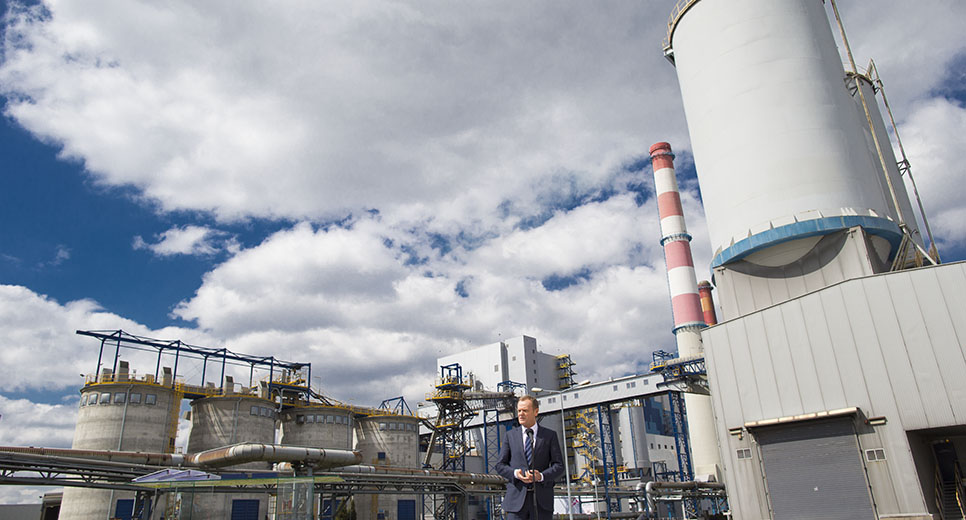Poland’s largest opposition party has joined the country’s biggest trade union, Solidarity, in calling for round table talks on Poland’s energy policies amid rapidly rising prices.
The union proposed the solution after its members interrupted a press conference called by Civic Platform (PO), which blames the ruling Law and Justice (PiS) party for the soaring cost of electricity and gas.
But members of Solidarity say that the current problems are the result of European Union climate policies and the actions of the former PO-led government.
At the start of this year, gas bills jumped by an average of 54% and electricity by 24%, with those new prices coming on top of months of rising inflation. Speaking on Saturday, the head of PO’s parliamentary caucus, Borys Budka, said that the soaring costs are “an example of PiS incompetence”.
PO’s press conference was held outside Jaworzno power plant, whose new 910MW coal-fired block cost state-run energy group Tauron 6 billion zloty (€1.3 billion) but has not been switched on due to problems that only became apparent after construction was completed in mid-2020.
“Six years in power and they can’t start up this block,” said Budka, who called for “competent people” to be put in charge of the energy sector. He accused the government of wasting large EU subsidies from energy certificates.
Tu jeszcze lepsza odsłona konfrontacji lidera PO z Polakami. Nieprędko Borys Budka wybierze się znowu Polskę. pic.twitter.com/7y3pDbqwta
— Błażej Poboży (@pobozy) January 15, 2022
However, Solidarity members interrupted the press conference, accusing PO of “lying”. They blamed rising prices on EU climate policies, which they said had been decided during the rule of former PO prime ministers Ewa Kopacz and Donald Tusk, the latter of whom went on to serve as president of the European Council.
Solidarity – which includes many miners among its members – has led protests against EU green policies and against an order for Poland to shut down Turów coal mine. The union’s leader, Piotr Duda, warned that they would “set fire to Europe” if the EU continued to threaten Polish jobs and energy sovereignty.
Also present at Saturday’s conference was the head of Tauron’s local unit in Jaworzno, Sebastian Gola, who likewise said that high energy prices are caused by the EU’s emissions trading scheme. He claimed that fuel costs between 100 and 120 zloty per megawatt-hour in the block, but that the European levy adds 400 zloty on top of this.
Earlier this month, Tauron – which is Poland’s biggest supplier of electricity, with over a third of the market – wrote to its customers to inform them that 59% of electricity costs result from EU emissions allowances and a further 8% from EU requirements on renewable energy and energy efficiency.
That matched figures presented by the government, which has blamed the EU and previous government for energy prices. However, critics of the government say that it has been too slow to move Poland away from reliance on coal, which has resulted in higher costs for emissions.
On Saturday, Solidarity called for a round table between union representatives, the government and the opposition to discuss the future of energy in Poland. “It is not about fighting, but talking wisely about the Polish energy sector and looking for solutions,” said Bogdan Tkocz of the union, quoted by TVN24.
Budka said his party would welcome such discussions and called on the prime minister, Mateusz Morawiecki, to show the “courage” to “come and sit down for talks”.
Poland currently relies on coal for almost 70% of its energy generation, by far the highest figure in the EU. That number has been declining slowly in recent years, but the government, under EU and market pressure, recently outlined an ambition to reduce it to as little as 11% by 2040.
A report published earlier this month estimated that compliance with the EU’s planned target of reducing emissions by 55% relative to 1990 levels by 2030 will cost Poland almost €530 billion.
Main image credit: M. Śmiarowski / KPRM (under CC BY-NC-ND 2.0)

Maria Wilczek is deputy editor of Notes from Poland. She is a regular writer for The Times, The Economist and Al Jazeera English, and has also featured in Foreign Policy, Politico Europe, The Spectator and Gazeta Wyborcza.




















